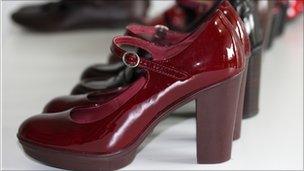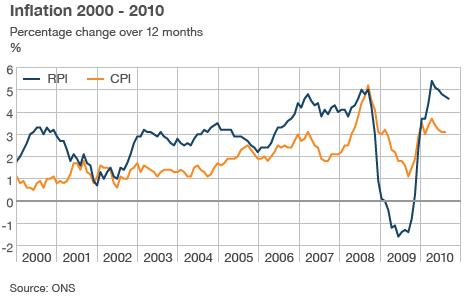UK inflation rate stays at 3.1% in September
- Published

A record jump in the price of shoes and coats in the new autumn ranges helped keep inflation unchanged
UK Consumer Prices Index (CPI) inflation remained unchanged in September at 3.1%, according to the Office for National Statistics (ONS).
The Retail Prices Index, which includes a higher proportion of housing costs, fell back slightly to 4.6%.
September's figure is of key importance to claimants as it sets the rate at which benefits change in April.
Most benefits are now linked to the CPI and will rise by 3.1%, but pensions will increase by the higher 4.6% RPI.
RPI - which factors in a greater chunk of the cost of housing - is also important for wage negotiations.
Benefits
The inflation linking for welfare payments was changed in the Budget from RPI, which is generally higher than CPI and should therefore lead to less money for claimants and savings for the government.
Lee Healey, from the benefits experts, Incomemax, said that although the amount of money involved may look small, it would make a huge difference.
"The point is, these come on top of lots of other cuts coming in. Cuts in child benefit, cuts in help with mortgages and in housing benefit. Add all that together and it's a big squeeze on people with low incomes," he said.
The ONS said there were both significant upward and downward pressures on inflation in September.
Clothing and footwear prices saw a record rise, as summer fashion discounts ended and new, higher-priced autumn ranges hit the shops.
Jonathan Loynes, chief European economist at Capital Economics, said the rise in clothes prices could be seen as a worrying development.
"This may lead to some concerns that the constant downward pressure on High Street goods prices from cheap imports seen over the last decade or more is finally coming to an end," he said. "But we suspect such conclusions would be premature."
Interest rates
The price of meat and fruit rose, but there was no sign that the recent spike in grain prices had led to higher prices in British grain-based goods.

Airfares saw the most dramatic fall, down by 27.8% after rising by a record 16% in August.
Although the CPI figure remains above the 2% target - and has been there for 10 months in a row - the Bank of England expects that to be temporary and interest rates - as set by the Bank's Monetary Policy Committee (MPC) are likely to remain at their record low levels.
One of its members, David Miles, in a speech on Tuesday, said the bank had to balance the need to bring down inflation against raising interest rates too soon and killing the recovery.
His comments reinforced expectations that rates will remain on hold for some time yet.
Some business groups are calling for monetary policy to become looser, arguing that the Bank may have to pump more money into the economy by way of another round of quantitative easing.
One of these is the British Chambers of Commerce (BCC), which released a survey on Tuesday showing that economic activity slowed sharply in the third quarter of the year.
Its chief economist, David Kern, said "The threat of a major setback to growth remains much bigger than that of a surge in inflation.
"We continue to urge the MPC to increase quantitative easing by £50bn before the end of the year."